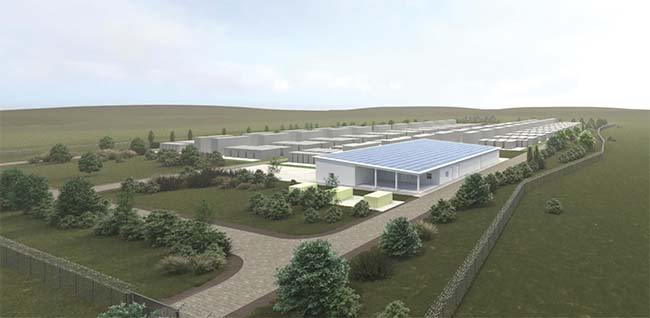Storage-as-Transmission Project Announced for Germany
Credit to Author: Darrell Proctor| Date: Tue, 01 Nov 2022 04:11:00 +0000

A project known as Netzbooster, or Grid Booster, is being deployed in Germany, designed to improve the efficiency of the country’s existing power grid infrastructure. Fluence Energy GmbH, a subsidiary of Fluence Energy, and TransnetBW GmbH—which operates the electricity transmission system in Germany’s Baden-Württemberg state—announced the project in October, calling the 250-MW battery-based energy storage system (BESS) the world’s largest energy storage-as-transmission project.
 |
1. The Netzbooster concept, shown in this rendering, envisages a modular design, with a central operating building and several containers in which the batteries are located. Courtesy: TransnetBW |
The companies said the BESS, supplied by Fluence, will improve Germany’s energy security, while supporting the country’s energy transition by increasing the power grid’s efficiency and stability. The BESS will be located at Kupferzell, a major German grid hub. The project is expected to come online in 2025. Netzbooster (Figure 1) is expected to reduce the operating costs of Germany’s electricity transmission system, in part by reducing the number of required preventive measures to operate the grid, increasing grid utilization, and limiting the need for traditional network reinforcement and expansion.
The Netzbooster plan was introduced in 2019 and considered a concept vehicle under Germany’s 2030 grid development initiative. Officials in a news release said, “The TransnetBW Netzbooster will allow for the more efficient operation of existing transmission infrastructure and lower preventive redispatch measures. This will reduce the need for conventional network reinforcement and operating costs, thus decreasing network charges and ultimately energy costs to consumers. The system will also ease bottlenecks stemming from transporting wind energy from Germany’s north to the country’s southern load centers. In the event of a failure in the transmission grid, the TransnetBW Netzbooster system will react within milliseconds to provide backup capacity to maintain power system stability.”
Paul McCusker, senior vice president and president for the Europe, Middle East, and Africa (EMEA) region with Fluence, said, “We are proud to work with TransnetBW, a forward-thinking TSO [transmission system operator] that leads the way in the application of innovative technologies that futureproof power networks, stabilize energy costs to end-users, and increase renewable deployments.” McCusker added, “Realizing the Netzbooster project marks a turning point to accelerate the buildout of energy storage at the transmission network level in Germany and across Europe. We look forward to delivering this highly complex energy storage application at a scale required to support the country’s energy transition. Given the current energy crisis impacting Europe and the focus on accelerating renewable buildout under the RePowerEU plans, the deployment of this project is more urgently needed than ever.”
Dr. Werner Götz, CEO and chairman of the executive board at TransnetBW, said, “To secure the industry-leading energy storage supplier to deliver our Netzbooster project is highly pleasing, but also underlines our high standards and expectations.” Fluence officials said the project builds on more than 14 years of experience in the company’s deployments of BESS systems. The installation is a new application of Fluence technology, and looked at as a “proof-of-concept highlighting the value of battery-based energy storage for enhancing transmission infrastructure and driving deployment throughout Germany, Europe, and across the world.”
The Netzbooster system will support the transmission network through delivery of a suite of services, including synthetic inertia, dynamic voltage control, contingency support, and congestion management, among others. Project leaders said the use of energy storage to support transmission and distribution networks is expected to grow rapidly, as the increased penetration of renewable energy resources causes more network congestion, requiring grid reinforcement and release interventions.
“Fluence is committed to accelerating Germany’s energy transition. Working with TransnetBW to deliver this Netzbooster project will result in a critical contribution to the country’s energy security and the stabilization of energy costs,” said Markus Meyer, managing director at Fluence Energy GmbH. “Through our advanced product capabilities, extensive energy market experience, and expert knowledge of complex TSO-specific applications, Fluence is well positioned to serve as a key long-term partner to TSOs in Germany, Europe, and globally, in deploying energy storage as the backbone of modern, resilient, and decarbonized energy systems.”
Project designers note that Netzbooster is being built at what is considered a strategic network node. Most new onshore and offshore wind developments are sited in the windy northern area of Germany, while the country’s thermal power plants are located in southern Germany, near industrial cities such as Munich and Stuttgart. Those nuclear and coal-fired plants, though, have been or are being retired, which means grid operators are building new transmission lines to bring renewable energy from the north to the high-load areas of southern Germany. The Netzbooster project is expected to enable grid operators to increase the utilization of both existing and new transmission lines, and serve as a way for Germany’s energy industry to study the concept of a reactive power transmission system.
—Darrell Proctor is a senior associate editor for POWER (@POWERmagazine).
The post Storage-as-Transmission Project Announced for Germany appeared first on POWER Magazine.